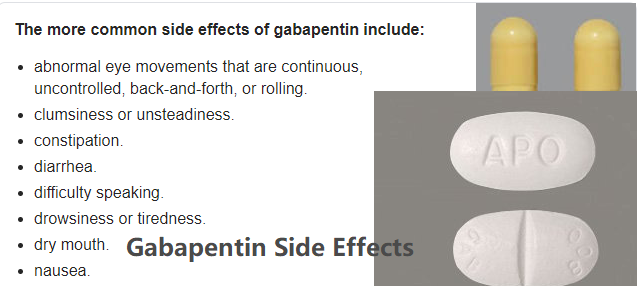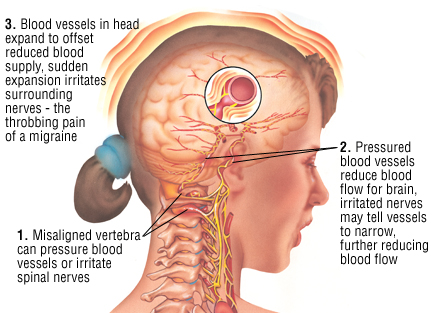Gabapentin oral capsule can cause mild or serious side effects. The following list contains some of the key side effects that may occur while taking gabapentin.
This list does not include all possible side effects.
For more information on the possible side effects of gabapentin, or tips on how to deal with a troubling side effect, talk with your doctor or pharmacist.

More common side effects
Some of the more common side effects that can occur with use of gabapentin are listed below, along with their rates:
Also:
- viral infection
- fever
- nausea and vomiting
- trouble speaking
- hostility
- jerky movements
The side effect rates are based on patients over 12 years old, as reported in clinical trials for the brand equivalent, Neurontin. Certain rates vary by age. For example, pediatric patients 3 to 12 years of age most commonly experienced viral infection (11%), fever (10%), nausea and/or vomiting (8), tiredness (8%), and hostility (8%). There were no clinically significant differences in rates between men and women. For more information, see the FDA package insert.
If these effects are mild, they may go away within a few days or a couple of weeks. If they’re more severe or don’t go away, talk to your doctor or pharmacist.
Serious side effects
Call your doctor right away if you have serious side effects. Call 911 if your symptoms feel life-threatening or if you think you’re having a medical emergency. Serious side effects and their symptoms can include the following:
- Changes in mood or anxiety. Symptoms can include:
- thoughts of suicide or dying
- attempts to commit suicide
- anxiety that’s new or gets worse
- crankiness that’s new or gets worse
- restlessness
- panic attacks
- trouble sleeping
- anger
- aggressive or violent behavior
- extreme increase in activity and talking
- unusual changes in behavior or mood
- Changes in behavior and thinking, especially in children ages 3 to 12 years. Symptoms can include:
- emotional changes
- aggressiveness
- trouble concentrating
- restlessness
- changes in school performance
- hyper behavior
- Serious and life-threatening allergic reaction. Symptoms can include:
- skin rashes
- hives
- fever
- swollen glands that do not go away
- swollen lips and tongue
- yellowing of your skin or the whites of your eyes
- unusual bruising or bleeding
- severe tiredness or weakness
- unexpected muscle pain
- frequent infections
Detail Side Effects of Gabapentin
For the Consumer
Applies to gabapentin: oral capsule, oral solution, oral suspension, oral tablet
Along with its needed effects, gabapentin may cause some unwanted effects. Although not all of these side effects may occur, if they do occur they may need medical attention.
Check with your doctor immediately if any of the following side effects occur while taking gabapentin:
More common
- Clumsiness or unsteadiness
- continuous, uncontrolled, back-and-forth, or rolling eye movements
More common in children
- Aggressive behavior or other behavior problems
- anxiety
- concentration problems and change in school performance
- crying
- depression
- false sense of well-being
- hyperactivity or increase in body movements
- rapidly changing moods
- reacting too quickly, too emotional, or overreacting
- restlessness
- suspiciousness or distrust
Less common
- Black, tarry stools
- chest pain
- chills
- cough
- depression, irritability, or other mood or mental changes
- fever
- loss of memory
- pain or swelling in the arms or legs
- painful or difficult urination
- shortness of breath
- sore throat
- sores, ulcers, or white spots on the lips or in the mouth
- swollen glands
- unusual bleeding or bruising
- unusual tiredness or weakness
- Abdominal or stomach pain
- blistering, peeling, or loosening of the skin
- clay-colored stools
- coma
- confusion
- convulsions
- dark urine
- decreased urine output
- diarrhea
- dizziness
- fast or irregular heartbeat
- headache
- increased thirst
- itching or skin rash
- joint pain
- large, hive-like swelling on the face, eyelids, lips, tongue, throat, hands, legs, feet, or sex organs
- loss of appetite
- muscle ache or pain
- nausea
- red skin lesions, often with a purple center
- red, irritated eyes
- unpleasant breath odor
- vomiting of blood
- yellow eyes or skin
Some side effects of gabapentin may occur that usually do not need medical attention. These side effects may go away during treatment as your body adjusts to the medicine. Also, your health care professional may be able to tell you about ways to prevent or reduce some of these side effects. Check with your health care professional if any of the following side effects continue or are bothersome or if you have any questions about them:
More common
- Blurred vision
- cold or flu-like symptoms
- delusions
- dementia
- hoarseness
- lack or loss of strength
- lower back or side pain
- swelling of the hands, feet, or lower legs
- trembling or shaking
Less common or rare
- Accidental injury
- appetite increased
- back pain
- bloated or full feeling
- body aches or pain
- burning, dry, or itching eyes
- change in vision
- change in walking and balance
- clumsiness or unsteadiness
- congestion
- constipation
- cough producing mucus
- decrease in sexual desire or ability
- difficulty with breathing
- dryness of the mouth or throat
- earache
- excess air or gas in the stomach or intestines
- excessive tearing
- eye discharge
- feeling faint, dizzy, or lightheadedness
- feeling of warmth or heat
- flushed, dry skin
- flushing or redness of the skin, especially on the face and neck
- frequent urination
- fruit-like breath odor
- impaired vision
- incoordination
- increased hunger
- increased sensitivity to pain
- increased sensitivity to touch
- increased thirst
- indigestion
- noise in the ears
- pain, redness, rash, swelling, or bleeding where the skin is rubbed off
- passing gas
- redness or swelling in the ear
- redness, pain, swelling of the eye, eyelid, or inner lining of the eyelid
- runny nose
- sneezing
- sweating
- tender, swollen glands in the neck
- tightness in the chest
- tingling in the hands and feet
- trouble sleeping
- trouble swallowing
- trouble thinking
- twitching
- unexplained weight loss
- voice changes
- vomiting
- weakness or loss of strength
- weight gain

